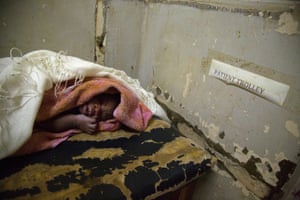{UAH} Uganda brought to its knees as doctors' strike paralyses health service
Public health services across Uganda have been brought to a standstill as doctors strike over pay and poor working conditions.
Members of the Uganda Medical Association (UMA) began nationwide action on 6 November over the government's failure to meet their demands for salary and allowance increases, as well as for a review of the supply of medicines and other equipment in health centres.
Talks between doctors and the government, which has called the strike illegal, ended in stalemate on Wednesday.
This week, President Yoweri Museveni deployed doctors from the military to public hospitals to cover services. Doctors are due to meet the president for talks on Friday.
The government issued a directive warning doctors to return to work or face serious consequences.
The standoff has left the public health care system in Uganda paralysed, with reports of patients dying as a result.
Doctors and medical interns are providing only emergency services, particularly in obstetrics, paediatrics and accident and emergency.
"Our health ministry is frustrating the effort and spirit of ending this strike. The intimidation must stop," said Ekwaro Obuku, from the UMA. "We want the government to address our issues and concerns. We shall attempt to resume the negotiations and continue to explore other possibilities."
Health minister Jane Aceng said: "It's very unfortunate that the doctors have decided to take it this way at the time when patients need them most. It's not in the interests of [the] medical profession to see patients die."
Uganda is experiencing a severe shortage of trained health workers across the country, particularly in rural areas, which has placed increasing demands on existing medical staff.
Ugandan doctors' pay is low. A medical officer earns 1.1m shillings (less than £230) a month, while a consultant is paid 2.6m shillings and senior consultant 3.4m a month.
The UMA is calling for wages for medical officers to increase to 15m, and 48m for senior consultants, with accommodation and transport provided.
The government has said it is willing to increase doctors' salaries but insists staff must await the outcome of a salary review commission, which is due in two weeks. The commission was set up by Museveni last month to review the remuneration of all civil servants and address discrepancies.
"For years and years government has refused to pay clinicians a living wage and ignored the plight of Ugandan patients who suffer the consequences of the health worker crisis. Deplorable remuneration in the public sector has left health workers with no option but to strike," said Asia Russell, executive director of the Health Global Access project.
But Regina Kamoga, chairperson of the non-profit Uganda Alliance of Patients' Organisations, said in a statement: "We believe that our doctors deserve better in their [remuneration] and welfare, [but] we, the patients' fraternity in Uganda, are extremely concerned that the doctors have preferred industrial action over saving lives and dialogue with government.
"We anticipate that the impact of the industrial action is already costing the lives of many innocent patients, children and expectant mothers at wards."
Dennis Odwe, a policy analyst on health and HIV-related issues, based in Kampala, said the full impact of the strike would be felt by people living with HIV and Aids, elderly people, and poor people in rural areas. "Threatening of the health workers will not help," he said.
Lizzie Wastnedge, a student doctor at Uganda's teaching hospital, Mulago, said it was easy to demonise doctors but "this fails to recognise the wider problem".
"For decades patients have become sick and [are] dying due to lack of the medications they need, and a lack of staff to treat them whilst the government has failed to act to improve the health infrastructure," she said.
To end the strike, the Ugandan government needed to commit to strengthening the health system, she added.
"This involves not only paying doctors and other healthcare workers fair salaries, but also improving the supply of essential medications and emergency equipment nationally, so that staff are able to treat the patients they see.
Disclaimer:Everyone posting to this Forum bears the sole responsibility for any legal consequences of his or her postings, and hence statements and facts must be presented responsibly. Your continued membership signifies that you agree to this disclaimer and pledge to abide by our Rules and Guidelines.To unsubscribe from this group, send email to: ugandans-at-heart+unsubscribe@googlegroups.com








0 comments:
Post a Comment